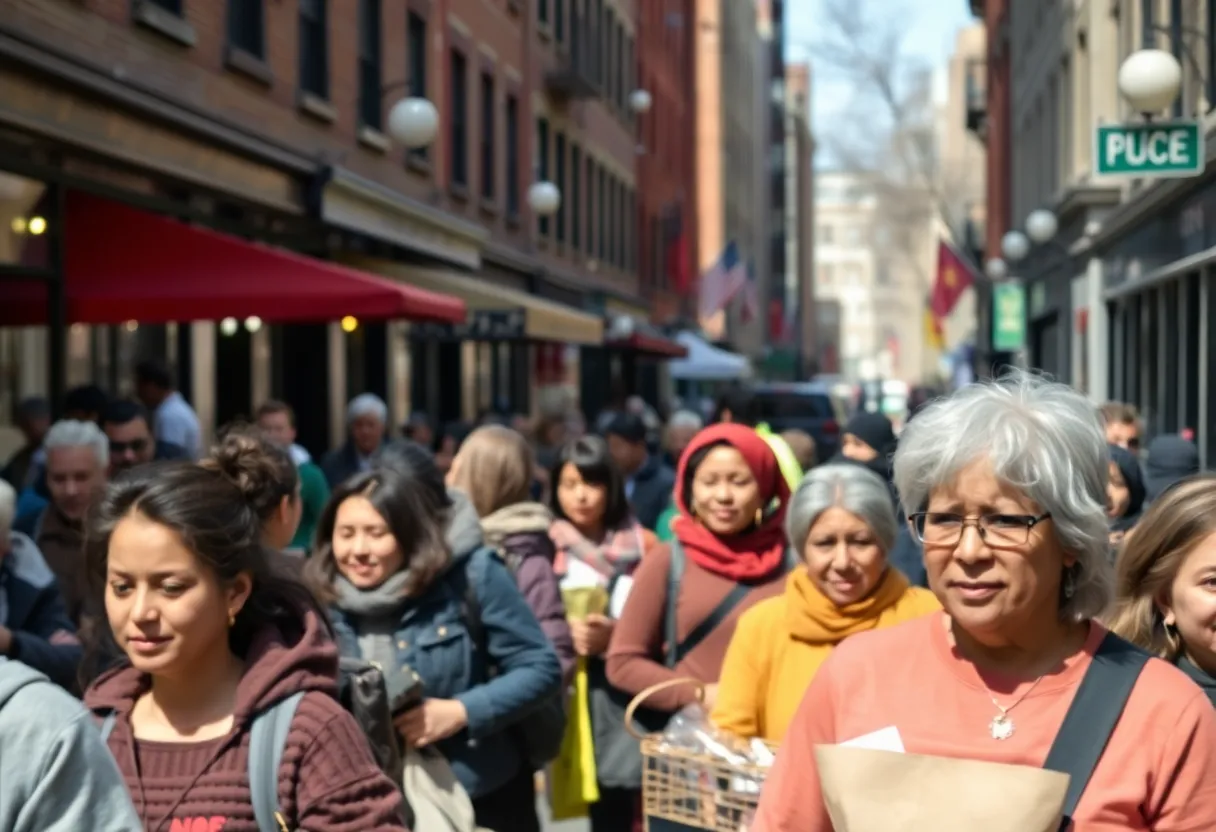Boston, September 3, 2025
News Summary
A newly enacted federal law, known as the One Big Beautiful Bill, is expected to reduce food aid for approximately 7% of Supplemental Nutrition Assistance Program (SNAP) recipients in the Greater Boston area. The law introduces stricter eligibility requirements and expanded work rules affecting around 40,000 adults, primarily in childless households. Advocates express concerns over the potential rise in food insecurity among vulnerable populations as Massachusetts state leaders consider budget proposals to mitigate the repercussions.
Boston
New federal law could reduce food aid for an estimated 7% of Boston-area SNAP recipients
A federal law enacted in July, known as the One Big Beautiful Bill, could cause reduced benefits or stricter eligibility for roughly 7% of Supplemental Nutrition Assistance Program (SNAP) recipients in the Greater Boston area. State and local estimates indicate about 40,000 adults in Greater Boston may face new work requirements that extend eligibility rules up to age 65, while changes to exemptions and immigrant eligibility could eliminate benefits for thousands more.
Who is affected and how
The law imposes several major changes to SNAP that will directly affect recipients in the Boston area:
- Stricter work rules: Expanded work requirements are projected to reach adults up to age 65, potentially affecting about 40,000 adults in Greater Boston.
- Narrowed parenting exemptions: The previous exemption for parents of children under 18 has been narrowed to parents of children under 14, placing about 11,000 parents with teenagers at risk of losing eligibility or facing additional conditions.
- Elimination of certain exemptions: Veterans and people experiencing homelessness are no longer automatically exempt from work requirements under the new federal rules.
- Impact by household type and demographics: Nearly 31,000 of those expected to be affected live in childless households. Demographic projections show roughly 18,000 white adults could be impacted by the new age-based work rules, and about 5,000 Latino adults could lose eligibility because of the narrowed parenting exemption.
- Immigrant eligibility cuts: Approximately 9,600 legally present immigrants with humanitarian protections, including refugees and trafficking victims, would become ineligible for SNAP under the federal change.
Scale and funding changes
The new legislation includes a significant funding reduction and a cost-sharing mechanism. Nationwide, the law would cut SNAP funding by about $300 billion over the next decade. It also introduces a model requiring states to contribute part of their SNAP program costs based on each state’s payment error rate, effectively shifting additional financial responsibility to state governments.
Local totals and potential state budget impact
As of July 2025, nearly 579,000 Greater Boston residents were receiving SNAP benefits, with high participation concentrated in cities such as Lawrence and Brockton. Statewide figures cited by state leadership indicate that over one million Massachusetts residents rely on SNAP, including significant shares who are elderly, children, or people with disabilities. State officials estimate that the proposed federal cuts could cost Massachusetts nearly $710 million annually in food assistance funding unless the state takes further action.
State response and next steps
Massachusetts state leaders and the legislature face decisions about how to respond. The state is developing budget proposals that would provide limited extended benefits and other mitigation measures to reduce the immediate impact on households affected by the federal changes. The legislature must decide whether to adopt a new state plan to help SNAP recipients meet the revised federal requirements or to allocate state funds to offset lost federal support.
Employment and access concerns
Advocates and analysts point to persistent barriers to stable employment—such as uneven job availability, transportation constraints, caregiving responsibilities, and health limitations—that may affect recipients labeled as “technically able-bodied” but unable to meet stricter work conditions. Those challenges increase the risk that increased work mandates could result in higher food insecurity among low-income families.
Background: What the federal changes do
The One Big Beautiful Bill overhauls eligibility rules for SNAP by changing who is exempt from work requirements, narrowing parental exemptions, restricting eligibility for certain immigrant categories, and creating a state cost-sharing formula tied to payment error rates. The law also raises state administrative responsibilities and could compel states to redesign their SNAP plans or allocate new funding to keep current participation levels.
What this means for recipients
Families and individuals affected by the changes may see reduced monthly benefits, new reporting and compliance obligations, or full loss of eligibility. Populations at particular risk include adults in childless households, parents of older children, certain lawfully present immigrants with humanitarian statuses, veterans, and people experiencing homelessness.
Frequently Asked Questions
Who in Greater Boston is most likely to be affected?
About 40,000 adults may face stricter work rules; 31,000 live in childless households and 11,000 live in families with teenagers. Veterans, people experiencing homelessness, and certain legally present immigrants are also newly at risk under the changes.
How many SNAP recipients are in Greater Boston and statewide?
Nearly 579,000 Greater Boston residents received SNAP benefits as of July 2025. Statewide reliance on SNAP exceeds one million residents, according to state figures.
How will the law affect state budgets?
The federal law cuts SNAP funding by roughly $300 billion over the next decade and requires states to share costs based on payment error rates. Massachusetts officials estimate proposed cuts could cost the state nearly $710 million annually in food assistance funding without state intervention.
What steps is Massachusetts taking?
The state is proposing a budget that would provide limited extended benefits and is considering additional measures to help recipients meet new federal requirements. The legislature will decide whether to approve funding or policy changes to mitigate impacts.
What should SNAP recipients do now?
Recipients should monitor official state communications for eligibility guidance and enrollment changes, review any notices from SNAP administrators, and contact local assistance offices for help understanding new rules and available state supports.
Quick reference table: What to know
| Item | Detail |
|---|---|
| Law | One Big Beautiful Bill (enacted July) |
| Projected Greater Boston impact | About 7% of SNAP recipients; ~40,000 adults facing stricter work rules |
| Greater Boston SNAP recipients (July 2025) | Nearly 579,000 people |
| Statewide SNAP reliance | More than 1,000,000 residents (state figures) |
| Immigrants affected | ~9,600 legally present immigrants with humanitarian status lose eligibility |
| Funding change | ~$300 billion in cuts to SNAP over 10 years; state cost-sharing tied to payment error rates |
| Estimated state budget impact | Potential loss of nearly $710 million annually for Massachusetts without action |
| State actions | Proposed budget includes limited extended benefits; legislature to consider further measures |
Deeper Dive: News & Info About This Topic
HERE Resources
EBT Services Outage for Massachusetts Residents
Additional Resources
- Boston Herald: Millions in food aid for children and seniors at risk in proposed SNAP cuts
- Eagle Tribune: SNAP change looks to boost healthy foods, local farms
- NBC Boston: Thousands in Mass facing end to elevated SNAP food aid
- Boston 25 News: SNAP benefits change effective Oct 1
- CBS News: Massachusetts food banks SNAP big beautiful bill
- Wikipedia: Supplemental Nutrition Assistance Program
- Google Search: food assistance programs
- Google Scholar: snap benefits changes
- Encyclopedia Britannica: Supplemental Nutrition Assistance Program
- Google News: SNAP benefits Massachusetts

Author: STAFF HERE BOSTON WRITER
The BOSTON STAFF WRITER represents the experienced team at HEREBoston.com, your go-to source for actionable local news and information in Boston, Suffolk County, and beyond. Specializing in "news you can use," we cover essential topics like product reviews for personal and business needs, local business directories, politics, real estate trends, neighborhood insights, and state news affecting the area—with deep expertise drawn from years of dedicated reporting and strong community input, including local press releases and business updates. We deliver top reporting on high-value events such as Boston Marathon, Head of the Charles Regatta, and Boston Harborfest. Our coverage extends to key organizations like the Greater Boston Chamber of Commerce and Associated Industries of Massachusetts, plus leading businesses in finance, biotech, and insurance that power the local economy such as Fidelity Investments, Biogen, and Liberty Mutual Insurance. As part of the broader HERE network, we provide comprehensive, credible insights into Massachusetts's dynamic landscape.





